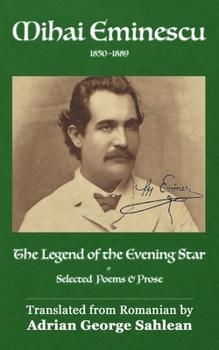The Legend of the Evening Star: Selected Poems & Prose
Mihai Eminescu (1850-1889) is often described as the essence of the Romanian soul, modern literary language in Romania is also much indebted to him. His work encompassed every genre of poetry as well as prose and journalism. Eminescu is considered Europe's last great Romantic not in the least because he brought a voice such unmistakable music to the sadness of love.
His legacy, however, transcends the confines of Romanticism, Western literary and philosophical traditions, and influences of the Far East. Blessed with the touch of genius, his synthesis is a personal world of meaning about the life of man and of the cosmos in archetypal images of universal worth.
The translator of Eminescu's poems, Adrian George Sahlean, was born in Romania. A US citizen since 1991, he holds Master's Degrees in English & Spanish philology (Bucharest, 1975), psychoanalysis (Boston, 1995) and is a certified clinical psychoanalyst (2002).
Adrian George Sahlean is the author of literary translations of poetry, short stories, memoirs, plays, fairytales and children's books. His meter-and-rhyme English renditions from the Romanian national poet Mihai Eminescu (1850-1889) earned several international awards, including the UNESCO Gold Prize (2000), the LiterArt XXI Grand Prize (2002), and the National Center for Eminescu Studies Award for Translation (2016). In 2015, the volume of essays on literary translation Migălosul Cronofag (The Painstaking Chronophage), won the Book-of-the-Year award from the Romanian Writers Union.
The theatrical production of The Legend of the Evening Star, based on his translation of Eminescu's masterpiece Luceafărul, was twice staged off-Broadway in 2005 and 2008.
Excerpts from the Foreword:I was introduced to the work of Mihai Eminescu (1850-1889) by a Romanian American colleague who wanted me to direct her in an original dance theater piece. The idea was to use Eminescu's classic poem Luceafărul, set to music composed by another Romanian American specifically for this project and performed live on stage.
Having spent a life in the theater as a director and teacher, I was interested in the project, and intrigued that I had not heard of the man referred to as the national poet of his country. I wanted to learn more. However, after reading the English translation she provided, I was not impressed ...]
I was ready to turn down the project when she handed me The Legend of the Evening Star-Adrian G. Sahlean's translation of Luceafărul. It was hard to believe I was reading the same poem. The lyricism immediately drew me into a masterpiece. Then I looked at other translations by him. Again, I was astounded by the beautiful imagery of the poems, and the natural sound of the lines in English.
After reading these translations, I finally understood why Eminescu deserves the high regard in which he is held by his countrymen. He is a major poet that should be widely known. I have long believed that the art of translation is incredibly important ...]; the difference between one translation and another can actually affect how we understand another culture. ...]
I went on to direct and co-produce with my newfound Romanian friends two different weekend performances of Evening Star off-Broadway in 2005 and 2008. Audiences, while small because they had not heard of Eminescu, were much moved, entranced by the poem as an important parable about human nature and man's place in the universe. The second performance included a mise en scene based on an exchange of love letters with Veronica, Eminescu's lover and muse; it remains among my favorites of any piece I have directed. ...]
Terrence Montgomery Christgau




